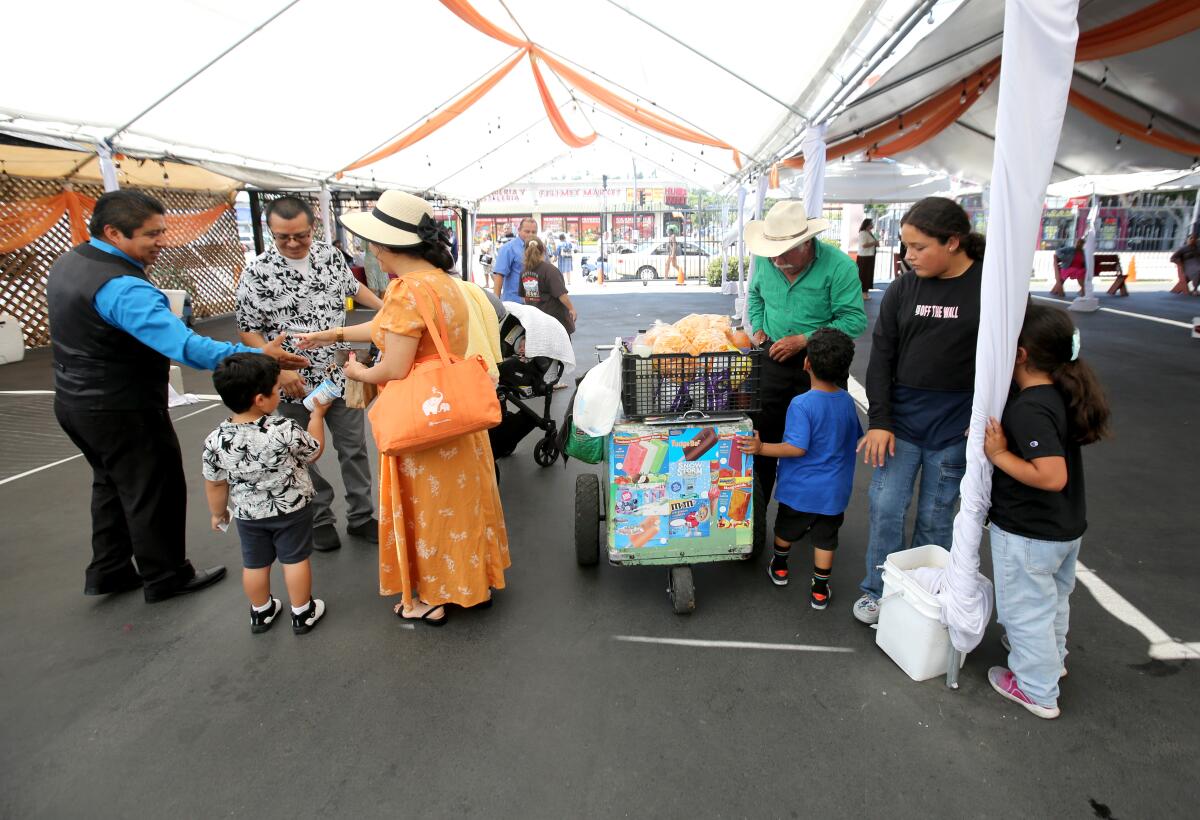Many immigrant workers face a grim future without retirement benefits. A California bill could help

- Share via
Whether in rain, raging winds or sweltering summer heat, José Villa can be seen on the streets of north Los Angeles, summoning smiles from children and adults alike. As the Mexican immigrant pushes a cart full of snow cones and popsicles, step by step the clang of his bells announces that his business is open to anyone who wants a sugary treat or immediate relief from the heat.
“I have a very sweet job because it makes a lot of people happy,” Villa said on one of his recent strolls through Highland Park. “But yes, my economic future could be very bitter. So for today I’m not going to think about it,” he added with a smile.
Villa wanted to retire at 62, but as an immigrant without legal documents, he can’t afford the luxury of resting at home. Immigrant workers of his legal status are ineligible to receive Social Security retirement benefits, even if they have paid taxes using an Individual Tax Identification Number, or ITIN, which is issued to people without a Social Security number for the sole purpose of filing federal taxes.

The native of Culiacán, in the northwest Mexican state of Sinaloa, came to the United States when he was 47. He’d grown up working in the fields, planting beans, peanuts, corn and sesame until he decided to try his luck across the border. With only a sixth-grade education, Villa was able to settle in Los Angeles and get a job as a restaurant cook. After 18 years of service, he was fired without explanation, he said.
With few job opportunities, Villa has been selling ice cream for seven years, but the money isn’t enough to rent an apartment or even a room, so he lives in a garage that his boss, the owner of the cart, has provided him indefinitely.
“I don’t know what fate has in store for me when my body gives up,” said the immigrant, adjusting his hat to screen out the sun. “I just have to have faith for a miracle to happen and the government to take pity on old people like me.”
Over the next decade, this bleak future looms for immigrants living in California without unemployment insurance, retirement benefits or another form of safety net, “in numbers unlike any state in modern history,” according to a UC Merced Community and Labor Center report released March 23. The report, titled “A Golden Age: California’s Aging Immigrant Workforce and Its Implications for Safety Net Policy,” asserts that in 2019, the noncitizen workforce in California was 2,984,821 migrant workers, of whom approximately 1,253,625 lacked legal work documents.
Among the noncitizen workers, 9,558 were then 75 or older, 67,960 were ages 65 to 74, and 316,539 were ages 55 to 64. Among workers without work documents ages 75 and older, there were 4,014 in 2019, while some 28,543 were 65 to 74 and 132,946 were 55 to 64 . These figures indicate that thousands of immigrant families will fall into extreme poverty, analysts and activists say.
With congressional action unlikely, some California politicians and immigrant activists are pushing legislation to bring relief to workers like Villa. The proposed AB 1536 would expand access to the Cash Assistance Program for Immigrants, or CAPI, to undocumented immigrants who, due to their immigration status, aren’t eligible for the Supplemental Security Income/State Supplementary Program for the Aged, Blind, and Disabled. Currently, the state-funded program provides a monthly cash benefit only to lawful permanent residents, refugees or asylum seekers.
Assemblyman Juan Carrillo (D-Palmdale), who introduced the bill on March 2, said that this population deserves to retire with dignity like any other U.S. worker who has paid taxes.
“The idea is to provide these people with monetary assistance, because many of them have worked for decades and contributed for many years to strengthen the California economy,” Carrillo said. “It is time to recognize the hard work they do in the farm fields and in other service industries such as agriculture, landscaping, construction services and restaurant service, among many others.”
In 2019, according to the IRS, more than 2.5 million ITIN tax returns were filed, representing nearly $6 billion in taxes. A study by New American Economy, a research and advocacy organization, showed that undocumented immigrants contribute an average of $13 billion to Social Security and $3 billion to Medicare per year.
Currently the CAPI program provides $1,100 per month to qualified immigrants. People without legal documents would have similar benefits, depending on their current economic status, Carrillo said.
Assemblyman Miguel Santiago, a co-author of the bill, said it’s imperative for politicians to support this expansion, as no one wants to see more homeless people on the streets of California in years to come.
“Need knows no disease, nor old age,” Santiago said. “These elderly people live in our communities, they are not going anywhere. Many of them continue to work, so it is crucial to attend to them at the basic level to live, which means monetary help so that they can eat and at least have a roof.”
AB 1536 is scheduled to be taken up by the state Senate appropriations committee Aug. 14.
For Villa, the additional income he would receive would enable him at least to rent a one-bedroom apartment instead of living in a garage with only a sofa and a television.
While Villa sells popsicles in north Los Angeles, to the south Roberto González, 69, washes cars.
González is drenched in sweat as he wipes the windows of a Ford Ranger pickup truck and then cleans the steel wheels.
The native of Puebla, Mexico, suffers from diabetes, high blood pressure and rheumatoid arthritis, which sometimes numbs the joints in his hands, making it difficult to work. But he aims to continue laboring at least five days a week so he can pool his meager earnings with one of his two children.
“The hot days are the hardest, but it is better to bear the sun than rain, because if that happens I no longer have a job,” said González, who has been cleaning cars for five years. The two years he initially planned to stay in the United States have stretched to 49.
“One says, ‘One more year and I’m gone,’ but all savings are spent on rent, bills and sending money to the family,” González said. “The truth is that I am afraid of being a burden to society, and especially to my two older children. Without being able to work, I would depend on them because I don’t have retirement benefits.”
González believes that if AB 1536 passed he could contribute to his son’s food bills and other household expenses.
Víctor Narro, project director and professor of labor studies at the UCLA Labor Center, said that although elderly undocumented immigrants urgently need help, strengthening Social Security seems to be a political non-starter, especially any plan that would extend it to immigrants who are undocumented.
“The state is facing an unprecedented crisis when it comes to its rapidly aging undocumented population,” Narro said. “Despite their efforts, pro-immigrant activists have failed to achieve immigration reform that would legalize these people after a 30-year struggle. This contributes to more people working under the table earning cash, while others manage to pay taxes that are not worth a retirement.”

Although Narro believes that political movement is essential to help elderly immigrant workers, he acknowledges that the bills face significant political hurdles. What’s more, he said, “Social Security has long been on shaky financial ground,” because as the U.S. population ages there are fewer workers supporting the growing number of Social Security beneficiaries, who as a group are living longer. Some analysts estimate that funds could run out as soon as 2034.
“People die without documents and without benefits, having given up their lives in a job,” said Angélica Salas, executive director of the Coalition for Human Immigrant Rights, or CHIRLA, which supports AB 1536. “If we don’t push this type of law now, in the coming years we are going to see more elderly people with disabilities, unable to work.”
“This is a moral issue, one of dignity and respect for seniors,” she added.
For workers like Villa and González, California’s bill offers a measure of hope.
“We are all going to grow old, and the only thing that is going to concern us is being healthy and having a roof and food,” Villa said. “I ask for nothing more than some return on my contributions.”
In González’s view, “God blesses those who shake hands with those who need it. I hope that the politicians think of us and give us that helping hand that we need.”
More to Read
Sign up for Essential California
The most important California stories and recommendations in your inbox every morning.
You may occasionally receive promotional content from the Los Angeles Times.











